A Month in Shanghai || The Highs, Lows and Surprises of Living with a Local Chinese Family
Hannah’s Homestay Experience in Shanghai || Culture Shocks, Challenges and Would She do it Again?
In October 2023, I took the biggest leap possible into Chinese culture and language: living with a Chinese family.

Having studied Chinese on and off for around three years, I felt that the time was right to put my Mandarin skills to the test.
I also wanted a chance to live and experience Chinese culture, rather than simply continue to read about it in a textbook.
So in this blog I’ll go through my whole LTL homestay experience – the good, the bad and the downright surprising.
I’ve also included things I would do differently if I did a homestay all over again, so you can learn from my mistakes!
Let’s get started.
Homestay in Shanghai || Preparing for the Journey
Homestay in Shanghai || Meeting my Host Family
Homestay in Shanghai || Language and Communication
Homestay in Shanghai || Food, Food, Food!
Homestay in Shanghai || Culture Shocks and Challenges
Homestay in Shanghai || Would I do it Again?
Homestay in Shanghai || FAQs
Homestay in Shanghai || Preparing for the Journey

Fail to prepare and prepare to fail!
Ok, probably a little on the dramatic side but when planning a trip to China, preparation really is key.
Paperwork and visas aside, the most important thing I did was download all the essential apps I’d need for getting by in Shanghai.
The apps I absolutely depended on and simply couldn’t get by without are:
WeChat (微信 Wēixìn)
The messenger app used by everyone in China that also doubles as a payment platform. I also needed this app to scan QR codes when travelling through the airport and to register my location with the police upon arrival.
Alipay (支付宝 Zhīfùbǎo)
One of the biggest payment apps in China and allows you to order coffee remotely, book taxis, pay in shops, etc. In my experience, Alipay is more international card friendly than WeChat – consider using the TourCard function (see the video below for full explanation).
Amap (高德地图 Gāo dé dìtú)
The Google Maps of China. You can ‘star’ locations like the LTL school, your homestay and the nearest subway station so you can always get directions and know how long it’ll take you to get there. You can also search for nearby restaurants, cafes, banks, etc.
A reliable VPN (+ backup!)
There’s a lot of options for the best VPNs to use in China, but it’s best to have at least two on all your devices before you arrive. For me, Astrill was by far the best.
China is truly becoming cashless and in at least two restaurants and cafes I visited, if you couldn’t use WeChat Pay or Alipay, you simply couldn’t order.
As for preparing for the actual moving in with a family of strangers part… that was admittedly pretty minimal. I focused a lot more on the practical elements.
If you adapt to new places easily and don’t mind sudden changes in your daily routine, you can probably turn up on the doorstep with your suitcase and go with the flow.
That being said, I would stress the importance of adding someone from your homestay on WeChat before you get to China to make sure you can contact them once you’re in the country and let them know roughly what time you’ll be arriving.

Once you’re WeChat friends, you can also message back and forth a little before you go so you can get to know the family beforehand.
⚠️ NOTE || I also didn’t have any specific dietary requirements, allergies or other relevant health conditions but if you have these, definitely communicate them ahead of time!
I’d also strongly recommend getting their phone number and having it both on your phone and written down on a piece of paper (along with your homestay address), not just on your phone.
I opted for an airport pickup service and would 100% choose this again.
After a flight and getting through immigration, the last thing I’d want to do is track down a taxi or navigate public transport to get to my homestay. Once I found the driver holding my name up on a sign, I could stop thinking and just get taken where I needed to go.
As for the type of family I’d be staying with in Shanghai, I did have one key request with LTL prior to my arrival.
Most importantly, I knew I’d be busy exploring Shanghai a lot of the time, so I wanted a laid back family that wouldn’t mind if my schedule was a little hectic. I needn’t have worried, my homestay family couldn’t have been anymore chill!
As for the language, I did brush up on my Mandarin beforehand using the online Flexi Classes platform – a much needed confidence boost before I arrived!
If you’re new to Chinese, I’d recommend trying to learn the household basics before you arrive, especially words like:
| English | Chinese | Pinyin |
|---|---|---|
| Hello | 你好 | Nǐ hǎo |
| Thank you | 谢谢 | Xièxiè |
| Sure; Okay! | 好的 | Hǎo de |
| Yes | 是的 | Shì de |
| No | 不 | Bù |
| Breakfast | 早饭 | Zǎofàn |
| Lunch | 午饭 | Wǔfàn |
| Dinner | 晚饭 | Wǎnfàn |
| Today | 今天 | Jīntiān |
| Tomorrow | 明天 | Míngtiān |
| Set off | 出发 | Chūfā |
| Come home | 回家 | Huí jiā |
👉 It’s also super, super helpful to be able to count and say the time, as this can help with planning with your host family.
If you don’t know how to do that, check out this guide on telling the time in Chinese.

100+ Words and Phrases About Places in Chinese // Beginner Level
100+ vocabularies about places in Chinese meant as a starting point for beginners, to be able to share more details about what they did during the weekend.
Homestay in Shanghai || Meeting my Host Family
My host family lived in a compound north of Shanghai, conveniently right next to Line 1 on the subway.
Though on night one I was relieved to have the airport pickup service, as the driver took me inside the compound and helped me find the exact building (regular taxis I took the rest of the month always dropped me off at the outer gate).
I sent my homestay mom a message and she came downstairs to meet me – I couldn’t have been more grateful as she helped me haul my giant suitcase up all 6 flights of stairs!
Then all of a sudden I was in my new home.
It’s natural to feel a little awkward or out of place when you first arrive at a homestay.
Even though I was greeted with a warm welcome from the homestay family (mom, dad, a son and a daughter) I still felt like a tired, sweaty home invader that struggled to string a Chinese sentence together through the exhaustion.

Although I have to admit I was immensely relieved to find the homestay had a western style bathroom – I’d mentally braced myself for a squat toilet!
It also didn’t help that the dog, Xiao Q, was terrified of me on night one and barked relentlessly at me every time he saw me.
But homestay mom came to the rescue and gave me some chicken to feed him – soon won him over!
That evening, homestay mom showed me around the house and helped me register with the police online (remember to register with the police if you’re not staying at a hotel!) and explained how to get to the LTL Shanghai school in the morning.
My bed was certainly interesting – it had a bamboo sheet and pillowcase, but it wasn’t uncomfortable and I was soon fast asleep.
☀️ By the next morning, I was feeling far less awkward and enjoyed the breakfast of baozi and coconut water left for me by my homestay mom.
Over the next couple of days I felt more and more confident chatting to my homestay family in Chinese and I learned that I was the family’s fifth homestay student. It was oddly reassuring to know that other students had been through the exact same experience as me.
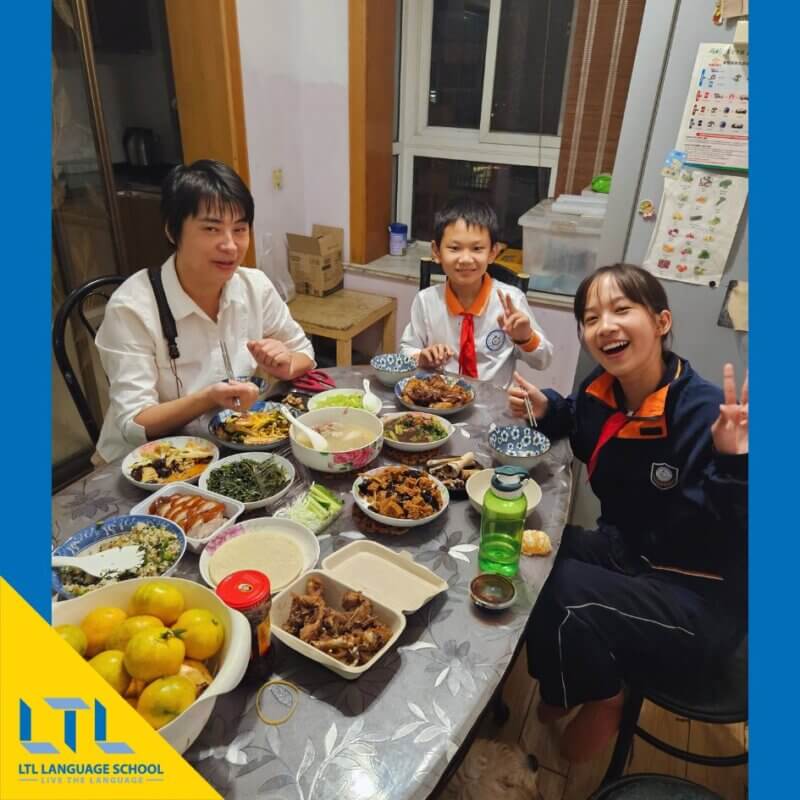
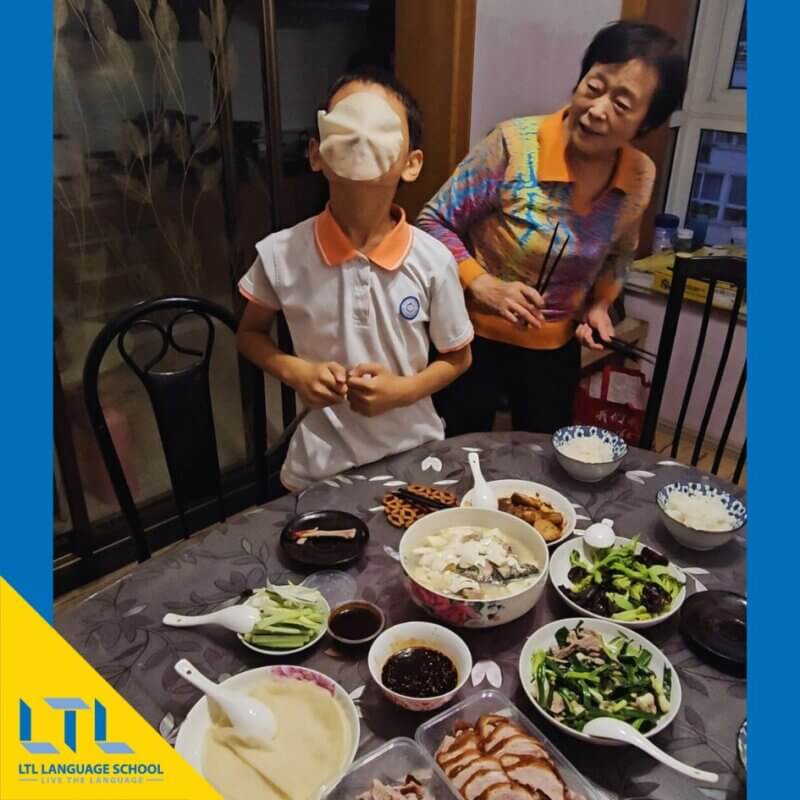
Homestay in Shanghai || Language and Communication
Even as someone who’d studied Chinese for 3 years, I still had my fair share of language hiccups and learned new words every day!
Mealtimes end up being a great time to practice Chinese, as you can chat about the food in front of you, ask about other peoples’ days or talk about your own.
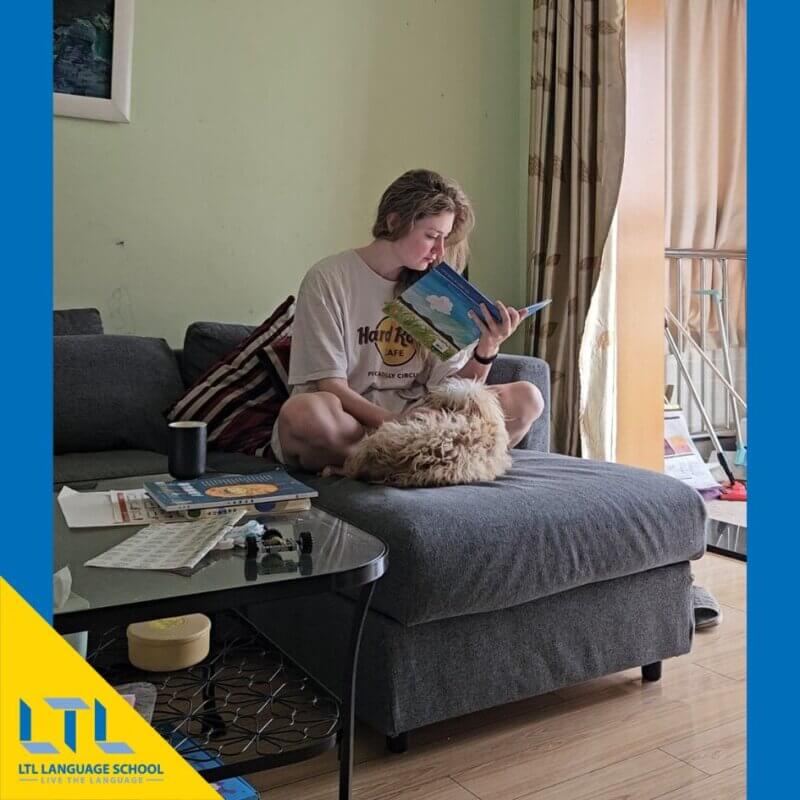
It’s also a great opportunity to be exposed to ‘real’ Chinese, as opposed to textbook language or the simplified language used by Mandarin teachers.
💡TOP TIP || if you struggle to remember names, especially Chinese names, ask your homestay family to write down their names, then you can keep those and double check the pronunciation anytime after.
Sometimes you’ll struggle with accents (as I did, having initially learned Chinese in Taipei) and encounter words you’ve never heard of, but it’s all part of the experience and a chance to improve.
For instance, at my first dinner, I realized my Chinese had a long way to go when the homestay mom and daughter were chatting away in rapid Chinese together. I could barely make out individual words, let alone understand them!
My homestay mom also had a pretty decent level of English, which gave us a linguistic safety net whenever I couldn’t understand the Chinese explanation for a word.
I did feel a little betrayed by HSK books at times… For instance, not once did I hear the word 洗 xǐ (wash) when it came to washing my cups, instead my homestay family almost exclusively used 冲 chōng (rinse) – nothing like not knowing a basic verb to make you feel out of your depth!
Despite years of study, I can still feel self conscious when it comes to speaking Chinese in front of native speakers. But when you’re forced to use Chinese as a daily communication tool, you really do forget to feel shy pretty quickly!
My host family were also infinitely patient when it came to explaining things to me and helping me find the words I needed.

Overall, my Chinese benefited massively from the experience.
👉 I also found that having an ‘activity’ to do whilst speaking Chinese is a great way to feel more at ease when chatting to native speakers.
Whether it’s playing Chinese chess, taking a day trip together or just dining together, having something else to do can take the edge of the pressure of chatting to a native Mandarin speaker.
It’s also definitely worth having some decent listening practice before you go to China, whether it’s listening to Chinese language podcasts or watching Chinese TV shows.
If you’re looking to really get comfortable with Chinese outside the classroom – staying with a host family is absolutely the way to go.
Homestay in Shanghai || Food, Food, Food!
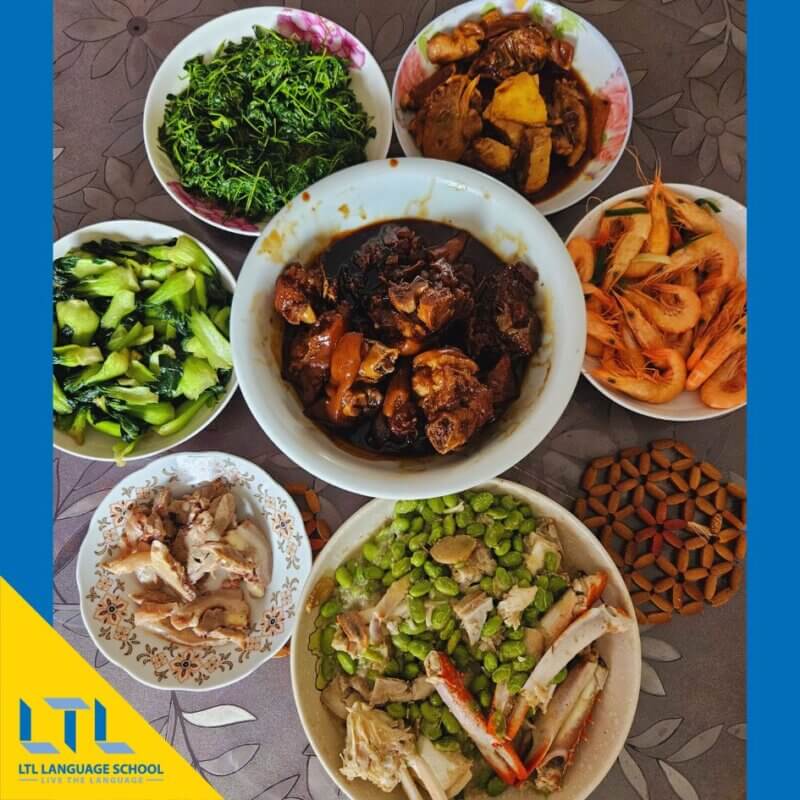
If you’ve never been to China and think that Chinese food is what you’ll find at your local Chinese takeaway (looking at you my British friends back home!) you’re in for a shock.
That being said, if you’re familiar with authentic Chinese food or simply a foodie who likes trying new things, homestays can be an absolute delight.
Equally, on occasions when I was craving home comforts, it was pretty easy to track down international supermarkets (some with an impressive cheese section!) and bakeries. There’s also plenty of international chains like Subway and KFC.
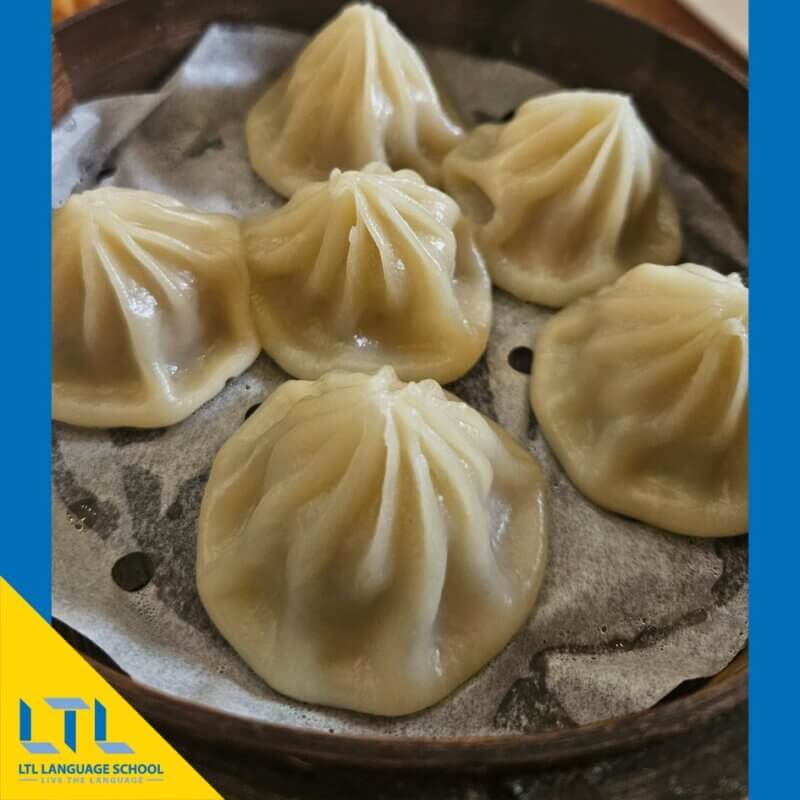
Breakfasts were a huge highlight for me.
I didn’t always get up early enough for 早饭 (zǎofàn; breakfast), but I made sure to never miss a Xiaolongbao day!
This Shanghai specialty, small soup dumplings, is one of my all time favorite foods and is absolutely the best start to any day.
A few times I was too busy exploring Shanghai or taking part in a game of Mahjong at the LTL school to make it back in time for dinner, but each time I made it back in time, the dinner never disappointed!
There’d usually be a mix of vegetable and meat dishes with a soup on the side.
As Chinese dining culture is a shared experience, you can simply try a few different things on the table and take extra helpings of what you like the most.
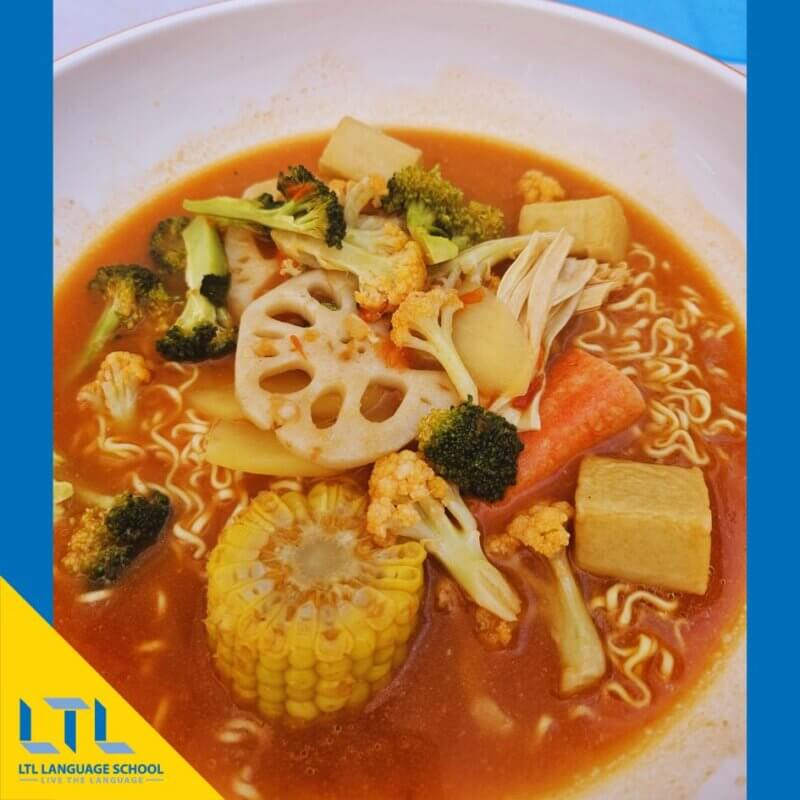
On a sweet note, I told my homestay mom that my favorite food was Beijing roast duck and so she went to the best two local Beijing duck places and brought it back for me to try.
Then on the final night, the family surprised me with my favorite one to have as our last meal together.
It’s also absolutely worth exploring the local neighborhood and trying as many foods as you can.
My personal favourite was a local 麻辣烫 (má là tàng) restaurant.
麻辣烫 is essentially a big bowl of (usually spicy) soup, filled with your choice of veggies, meat and noodles. I ended up loving that place so much I went there at least 5 times!

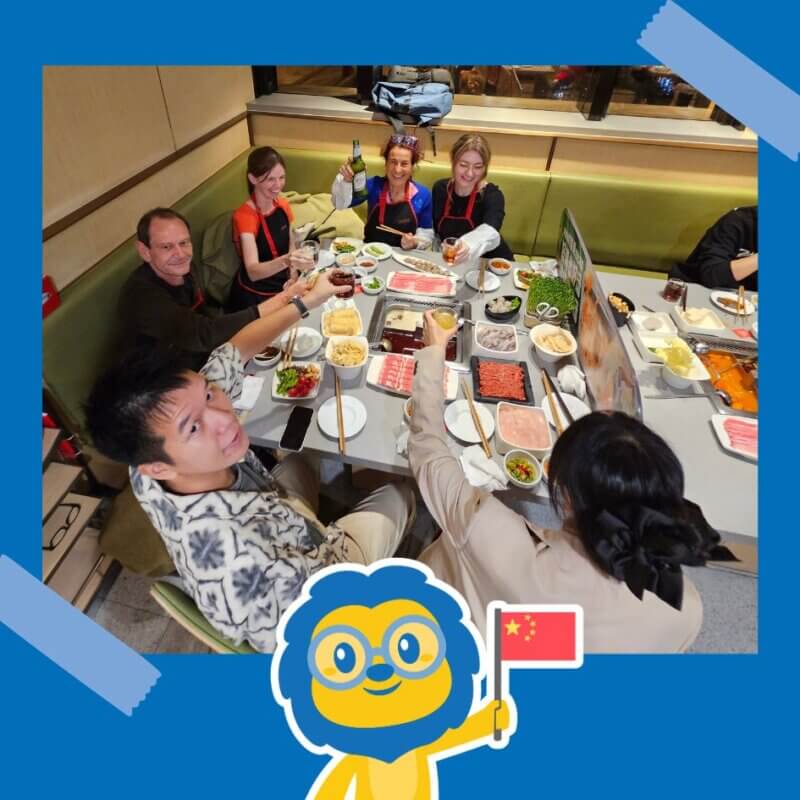
Homestay in Shanghai || Culture Shocks and Challenges
If someone warns you they’re going to punch you in the face, it’s still going to hurt when they do it.

That’s pretty much how culture shocks feel. You can be the most open-minded, well-read person in the world and still find differences pretty challenging. And that’s okay.
🐔 As for me, my biggest cultural shock involved one poor chicken.
I won’t go into too much detail, but we’ll just say I was very surprised to find a live hen happily clucking away in a cage in the hallway one day, and a not-so-live chicken in a bowl outside the bathroom the next day.
As a meat eater I certainly won’t criticize, but it was definitely not what I expected to see on my way to brushing my teeth!
Have you had any culture shocks in China? Let us know in the comments below!
Chickens aside, I found my family to be very laid back. My homestay mom in particular was curious about the UK and wanted to hear about how the two countries compared.
There are only two times I can think of where she was visibly surprised due to cultural differences and once wasn’t directly related to me.
The first was when she recounted a story of a previous homestay student who’d wanted to wash his shoes in the washing machine. She seemed pretty mind blown by this, so I laughed and reassured her I’d keep mine away.
The second time was when I caught a cold and asked for painkillers. Granted, I didn’t know the word for painkillers in Chinese and had to explain that I wanted ‘medicine you take when you’re in pain’ and I’m not still sure if I explained it terribly or if painkillers are a taboo in China, but either way, my homestay mom looked horrified!
Lesson learned: take your own painkillers!
Other small things I noticed that were a little different to what I was used to back in the UK: slippers and bowls.
Every time I entered the house and took off my shoes, I’d wear a pair of slippers to walk around the house. In the UK, most houses have carpet so there’s no need.
Not to mention it would be considered extremely odd to wear someone else’s slippers!
As for the bowls, for some reason in the shower and all the bathroom sinks, there were huge plastic bowls.
What were they for? I honestly have no idea. I realized after I left that I never asked why. I guess some things in life are just destined to remain a mystery.

Get Immersed in the Chinese Language: My Chengde Experience
Immersion, Immersion, Immersion It’s true when they say you won’t see any foreigners in Chengde. The only ones I met during my three months there were fellow LTL students or tourists, and even those were just a handful. 僧冠峰风景区 In…
Homestay in Shanghai || Would I do it Again?
In a word? Yes!
No matter how much I read about China and Chinese culture, there’s nothing even close to really living it.
Shanghai was full of adventures. Having a steady home base to return to and help me navigate the city really helped me ease into China life and really gave me that ‘home away from home’ feeling.



There’s also the small but sweet memories you make at a homestay.
For me it was things like peeling pomegranates in the living room with my homestay mom whilst chatting about life and being brought an extra warm blanket when the temperature dropped.
Next time, I would love to experience a homestay in a lesser known city like Chengde or Beihai, which aren’t as international as Shanghai and might offer some different cultural insights.
I’d also like to spend more time with my homestay family outside the house.
I was super busy and off on adventures on the weekends, so I didn’t get the chance to go on excursions with them, but I’d definitely want to do that next time and see China city through their eyes.
Living with a local Chinese family is truly a one of a kind experience and if you’re on the fence about trying it – just go for it, you won’t regret it!
Homestay in Shanghai || FAQs
Was food provided at your Chinese homestay?
Yes! I had breakfast and dinner included in my stay.
My host mom asked me about my preferences and encouraged me to try lots of new (and delicious!) dishes.
There was also plenty of fruit and snacks around for me to help myself to
Why did you choose a homestay and not stay by yourself?
I personally believe that culture and language are deeply intertwined and so for that reason, I wanted to live with a local family, eat local food and essentially feel like a local.
Staying at a homestay also kept me using Chinese when I got home, which was key for me as otherwise I’d have probably just binge-watched Netflix shows in English every night!
How long should I stay with a homestay?
This varies person to person and really depends on your preferences and learning goals.
Some students just want a few weeks to ease them into life in China, some students aim for total immersion and stay with their host families for months!
How can I arrange a homestay in Shanghai?
You can read more about LTL’s homestays in Shanghai here or you can get in touch with a student advisor here to start planning your trip to China today!
Does LTL offer homestays Mandarin language homestays in other cities?
They do – and not just on the Chinese mainland.
You can choose from big cities like Beijing and Chengdu, or more immersive courses like Chengde, Xi’an and Beihai.
In Taiwan, you can choose from Taipei, Kaohsiung, Tainan and Taichung.
There’s even the option to take a Mandarin-language homestay in Singapore.
Check out all the Chinese language homestay options here.
Does LTL offer homestays for Japanese, Korean and Vietnamese?
They do indeed! Check out the following sites:
Want more from LTL?
Want to learn Chinese from the comfort of your own home? Then our 24/7 online Chinese lessons might be the thing for you.
We offer a 7 day free trial to all new online students where you can study Mandarin 24/7.
Come and check it out free of charge and see what you think!
If you wish to hear more from LTL Language School why not join our mailing list?

















 Hi, my name is Manuel! I am from Spain and I am a Student Advisor at LTL and I’m based at our Taipei school.
Hi, my name is Manuel! I am from Spain and I am a Student Advisor at LTL and I’m based at our Taipei school. Hi, my name is Mojca! I am from Slovenia in Europe and I work as a student advisor at our Shanghai school.
Hi, my name is Mojca! I am from Slovenia in Europe and I work as a student advisor at our Shanghai school.

